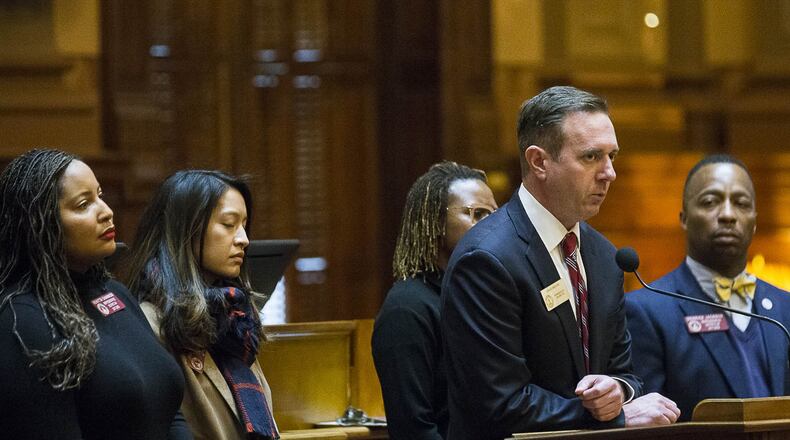With the new state legislature getting started this week, and Democrats in the majority in the Fulton County delegation for the first time in more than a decade, Rep. David Dreyer is hopeful certain local issues will get more attention at the Capitol this year.
Last fall's election saw a dramatic shift in the balance of power across metro Atlanta's suburbs that had historically been controlled by Republicans. Democrats picked up seats in Fulton, Gwinnett and Cobb counties, and now have majorities in each. DeKalb County now has no Republican members of its delegation.
Fulton’s House delegation now has 19 Democrats and six Republicans, where last year the balance was 12 Democrats and 13 Republicans. In the Senate, Democrats now have seven seats and Republicans have four, versus last year’s total of five Democrats and six Republicans.
Dreyer, a Democrat from Atlanta and the likely chair of the county's House delegation, said with the party in control locally, he hopes to create more opportunities for affordable housing and treatment of HIV/AIDS.
He wants Fulton to have more say regarding membership on local boards, like MARTA and the county election division. And he wants south Fulton to be treated as an equal partner to the north.
“One thing is, I think you’re going to see us pay attention to all parts of Fulton County equally,” he said. “What you can expect is a lot of hard work and diligence. Voices from all parts of the community are going to be elevated.”
State government is still controlled by Republicans, but more Democrats represent constituents in Fulton and other counties in metro Atlanta. Lawmakers often defer to local delegations for bills that are relevant to specific areas, and those delegations can help shape the agenda at the Capitol for local issues.
Robb Pitts, the Fulton commission chairman, said a change in philosophy for leaders might mean more success in passing legislation that's a priority to the county. Rep. Roger Bruce, D-South Fulton, said he expects more conversation around improving transit and other transportation, and expanding Medicaid through a waiver for Grady Health Systems.
Sen. Jen Jordan, D-Atlanta, said Democrats will have more control over what legislation moves forward, and what does not. She hopes to get more feedback from city, school and county partners in order to find out what they need from the body, and act accordingly.
“I want to make it less political,” Jordan said. “I want to make sure what we’re doing makes sense for them.”
For their part, Republican leaders said they don’t expect much to change. Sen. John Albers, R-Roswell and the outgoing delegation chair in the Senate, said changes the legislature made previously to give the delegation some control over boards and other operations have “borne a lot of fruit.” He said he expects to work well with the Democrats, and isn’t aware of anything that needs to change regarding the amount of control county government has over local decisions.
County commissioners have discussed wanting to be able to name their own elections board chair, and their concerns about not being able to appoint people directly to the MARTA board.
Rep. Chuck Martin, R-Alpharetta and the outgoing chair of the House delegation, said he expects the delegation to continue to work on behavioral health issues, transportation improvements and fixing issues with the property tax system. The county is operating better now that when the delegation made many of the changes that shifted some control, he said.
Dreyer said the Democrats would need Martin, Republican House Speaker Pro-Tem Jan Jones and others to “be engaged and interested in helping” if they wanted to get much done. But he said he’s optimistic.
“Our delegation flipped in a dramatic way,” he said. “We’ll see how we’re able to elevate some issues.”
About the Author
Keep Reading
The Latest
Featured



